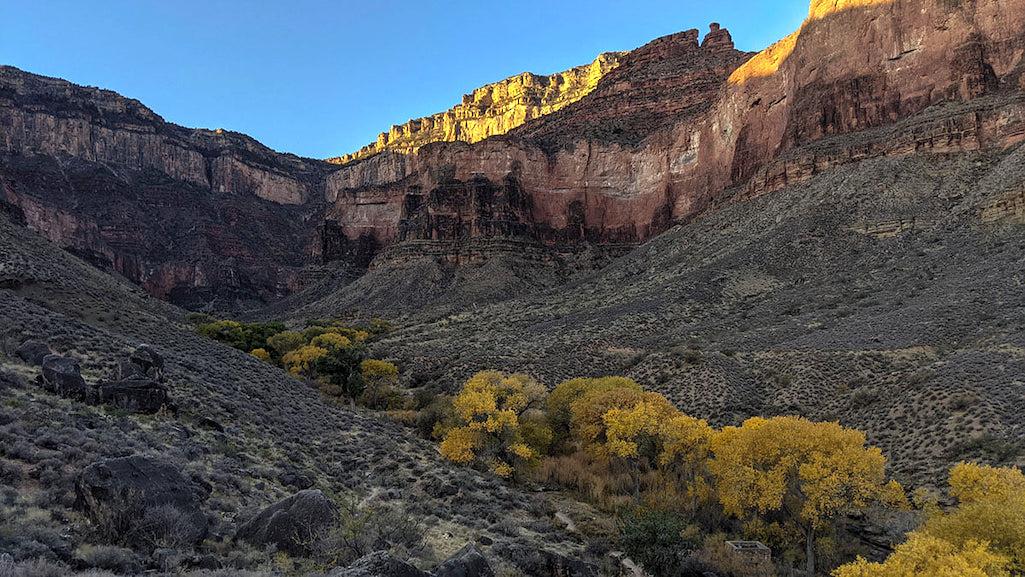
Havsupai Gardens during fall colors/NPS, K. Pitts
The Indian Garden Campground within the inner gorge of Grand Canyon National Park has been renamed Havasupai Gardens following a request from the Havasupai Tribe to change the name.
The U.S. Board of Geographic Names voted 19-0 to honor the request earlier this month.
The Havasupai Tribe earlier this year passed Resolution 29-21, which provided a formal request to the National Park Service to change the name. Havasupai Gardens is along the Bright Angel Trail and is a frequent stop for day hikers and backpackers exploring the backcountry of Grand Canyon.
Originally called Ha’a Gyoh, the National Park Service instituted policies that forced the Havasupai people from Ha’a Gyoh and in 1928, the last Havasupai resident, Captain Burro, was forcibly removed. Havasupai people continued to live and work within Grand Canyon National Park, despite the forced removal from the inner canyon.
“The eviction of Havasupai residents from Ha’a Gyoh coupled with the offensive name, Indian Garden, has had detrimental and lasting impacts on the Havasupai families that lived there and their descendants,” said Havasupai Tribe Chairman Thomas Siyuja, Sr. “Every year, approximately 100,000 people visit the area while hiking the Bright Angel Trail, largely unaware of this history. The renaming of this sacred place to Havasupai Gardens will finally right that wrong.”
Efforts are already underway to update signage, website and other materials with the new name.
“The Grand Canyon National Park team was proud to work alongside the Havasupai Tribal Council in our joint effort to rename this culturally significant location at the Grand Canyon,” said Superintendent Ed Keable. “The Havasupai people have actively occupied this area since time immemorial, before the land’s designation as a national park and until the park forcibly removed them in 1926. This renaming is long overdue. It is a measure of respect for the undue hardship imposed by the park on the Havasupai people.”
According to Ophelia Watahomigie-Corliss, a member of the Havasupai Tribe and former Council member, "Captain Burro" was a Native man who walked up and down the canyon to reach the Indian Garden area. "They began to call him Billy Burro. After all, he could hike up and down those walls just like a mule,” she said. "This man and his family were pushed out of Indian Garden, forced to leave the land they had farmed for generations so the national park could make it theirs. Billy Burro’s daily trail was turned into what is most of Bright Angel Trail today.”
Chairman Siyuja said that, "[T]he Creator made the Havasupai People the guardians of the Grand Canyon, and this is a role that we take very seriously. We are a small tribe. But our voices and our spirits are large.”
The Burro family changed their name to Tilousi, which means “storyteller.” For generations, the Burro-Tilousi family has fought to protect the history and culture of the Havasupai people.
“As a descendent of the Burro-Tilousi family I am glad to see that we will always remember and honor the true history of my family’s forced relocation due to the development of the Grand Canyon National Park,” said Carletta Tilousi, a member of the Havasupai Tribe and former Council member. “For that reason, honoring our ancestors and remembering our history is also very important to the Havasupai people. I hope this historic action will help other Tribes take similar steps and reclaim lands back by changing place names for historic and cultural preservation purposes.”
The Havasupai Tribe and NPS are currently planning a rededication ceremony in early Spring 2023.



Comments
This is the kind of renaming that makes sense, as opposed to the made up hysteria about the word squaw.